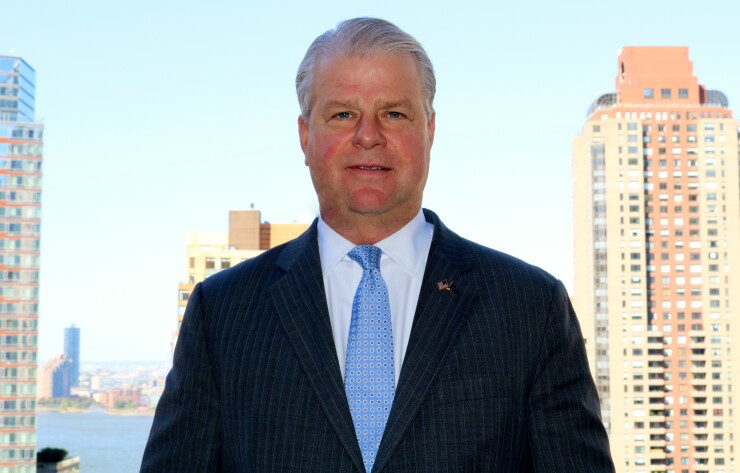Roberts & Ryan Investments Inc., a service-disabled veteran-owned institutional broker dealer, is building out its municipal market presence.
Reception has been positive among muni professionals, president Brian Rathjen said in an interview at the firm's New York headquarters. “They totally get what we’re trying to do,” he said.

Roberts & Ryan was recapitalized in April. New management personnel have led the firm’s participation as a selling group member for more than $2.3 billion of municipal issuance.
According to Rathjen, the firm is focusing on New York, California, Texas and Illinois as well as the public pension space. The firm, with 14 employees, is looking to expand to 25 within 18 months.
Citigroup selected Roberts & Ryan as a junior co-manager in notes offerings, while Morgan Stanley and Ginnie Mae chose it as a co-manager in other financings.
Significant recent deals have included Georgia and Minnesota general obligation bonds, Florida Department of Transportation right-of-way acquisition and bridge construction bonds, and New York City Transitional Finance Authority building aid revenue bonds.
“This is an exciting time for us,” senior advisor Robert Ceresa said.
Rathjen co-founded Kelson Group in 2010 and before that, established and built out the asset management division of Marwood Group. Overall, he has raised and placed more than $11 billion of assets.
His financial services career began at Prudential Securities as an institutional fixed income specialist after he left the Navy.
Daniel Roberts, a Marine Corps Vietnam War veteran and a Purple Heart recipient, founded the firm in 1987.
"I had a lot of sleepless nights," Roberts recalled of his early days.
Roberts, while president of the Disabled Veteran Business Alliance of California, was pivotal to the passage of a 1999 law establishing a framework that enabled several federal agencies to coordinate in providing entrepreneurial assistance to veterans and service-disabled veterans.

The law established an annual federal government-wide goal of making at least 3% of the total value of all prime contract and subcontract awards to small business concerns owned and controlled by service-disabled veterans. The law set a precedent nationwide, regardless of industry.
“Dan was one of the pioneers,” Rathjen said. "The 1999 bill provides an incentive to do subcontracting with military firms.”
Roberts, who remains an equity owner, previously was responsible for investments at Dean Witter Reynolds in the San Francisco area. He has managed more 1,000 investment accounts overall.
The majority of the firm’s employees are veterans.
“Our goal is to help veterans,” said Sadie Millard, the firm’s chief administrative officer.
“They have a vision in life and they are very proactive in trying to be value added,” Ceresa said of veterans.
Other senior team members include chief executive James Niemie; senior directors James McDevitt and Edward Reid; chief compliance officer Dan Ledva; chief operating officer Gerald O’Donnell; and managing directors Michael Jordan and Edward D’Alessandro.
Service-disabled veteran-owned status makes designated firms eligible for specific business set-asides. Amounts vary by state. Many public pension plans, government agencies, government-sponsored enterprises and corporations seek SDVO businesses.
Status requires no-less-than 51% ownership by one or more disabled veterans, and daily business operations need be managed and controlled by disabled veterans, according to Roberts & Ryan.
The firm's veteran initiatives include the Boulder Crest Retreat for wounded veterans and New York Helmets to Hardhats, a 501(c)3 program that helps military members start careers in building trades unions and affiliated employers.
In addition, the firm is developing a cybersecurity consulting unit to provide research and commentary on emerging trends.





